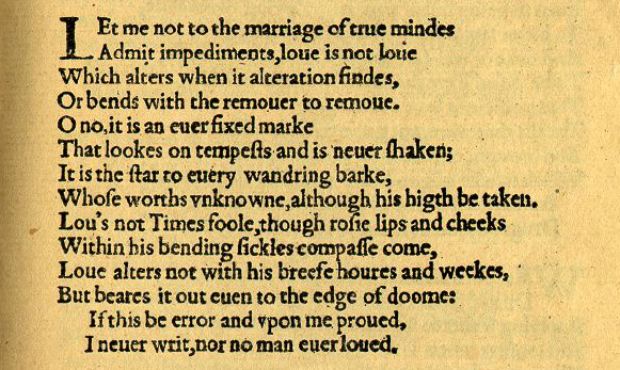There’s something about the idea of ‘original pronunciation’ (OP) that gets the pulse racing. I’ve been amazed by the public interest shown in this unusual application of a little-known branch of linguistics — historical phonology, a subject that explores how the sounds of a language change over time. I little expected, when I was approached by Shakespeare’s Globe in 2004 to help them mount a production of Romeo and Juliet in OP, that ten years on the approach would become a thriving linguistic industry. Nor could I have predicted that a short documentary recording about OP for the Open University (which I made with actor son Ben in 2011) would for no apparent reason go viral towards the end of 2013, with 1.5 million hits in recent months.
A dozen Shakespeare plays have now been produced in original pronunciation, including A Midsummer Night’s Dream at Kansas University in 2010 and Hamlet at the University of Nevada (Reno) in 2011. This year a group from the University of Texas (Houston) brought an OP production of Julius Caesar to the Edinburgh Fringe. Next January, Ben Crystal and his OP ensemble are presenting Pericles in Stockholm as part of an Interplay series along with the Swedish Radio Symphony Orchestra. More productions are in the pipeline.
But it isn’t just Shakespeare. The interest in him tops the list, but it is a long list, in which the work of any dramatist from the period can be treated in this way. And not just drama. Poems and prose too. My recording of the Sonnets is available on the website associated with the book Pronouncing Shakespeare. An OP recording by Ben of one of John Donne’s long sermons can now be heard as part of the Virtual St Paul’s Cross project.
Donne takes us forward in time to the 1620s. Going backwards in time, the British Library wanted an original pronunciation recording of William Tyndale to accompany the publication of its facsimile of the Tyndale Gospels. They chose the Matthew Gospel, and I recorded this for them in 2013. That takes us back to 1525. There are earlier recordings in the BL archive, made for the Evolving English winter exhibition in 2011-12, including extracts from Beowulf, Chaucer, Caxton, and Paston. The British Library also commissioned a CD of Shakespeare extracts from Ben and his ensemble: Shakespeare’s Original Pronunciation.

But the interest extends well beyond literature. Notably present in the talkback sessions after the first original pronunciation productions at the Globe were people interested in early music. And since then there have been many explorations into the kind of pronunciation used by Purcell (late 17th century), Dowland, and other composers. As with their literary counterparts, musicologists have been struck by the fact that so many of the rhymes in songs, madrigals, and operatic texts simply don’t work in modern English, and they want to hear them as they would have been. They note the way many of the vowels and consonants would have had different values in those days, and they want to explore how the texts would sound with those old values articulated. The result is a very different auditory experience, and — by all accounts — an exciting one.
Finally there are the heritage people. It’s all well and good establishing a historical centre where an old period is recreated, and people dress up in old clothes and walk around — but how should they speak? The occasional ‘verily’ and ‘forsooth’ isn’t enough. Here too we see an interest in recreating styles of speech that would have been used in those days.
Add all these constituencies together and you can see why the original pronunciation experiment has become something of an OP movement, with more and more people wanting to learn about OP, to hear it in practice, and to explore its application in texts that so far have received no study. Every new text brings to light something new — such as a previously unnoticed pun, or a fresh way of speaking a line. At university level, people are beginning to write dissertations on the subject. Ben, as I write, is exploring ways for his ensemble to cope with new OP commitments. There’s plenty to do. With only a dozen Shakespeare plays explored so far, that leaves a couple of dozen more awaiting investigation.
The consequence is an urgent need to provide materials to help people take original pronunciation activities forward. Paul Meier already has some tutorial material on his website, and his Dream production is available both as an audio recording and on a DVD. Several articles have now been written answering the usual questions people ask (such as ‘how do you know’?). And I am hard at work on an OP Shakespeare dictionary, which will enable people to make transcripts for themselves. I have paused, in the middle of letter N, to write this post. But with luck and a good following wind, I should have it finished in time for the great anniversary in 2016. And it will be published, of course, by Oxford University Press.
The post The lure of sounds appeared first on OUPblog.


